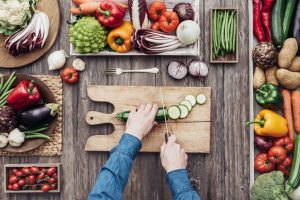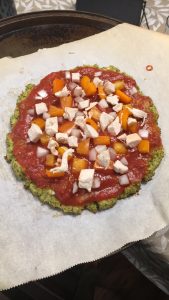February 2018 Newsletter
Featured Webinar
Healthy Gut, Healthy Body: Healing the Gut with Biological Medicine
Featured Article
Whole Foods Pantry and Healthy Grocery List
BY: DR. TORY JACKSON

Man cooking and slicing fresh vegetables on a rustic kitchen worktop, healthy eating concept, flat lay
Transitioning into a gluten-free, dairy-free, plant-forward, whole foods or customized diet your healthcare provider has suggested can be overwhelming for some.
It takes time to make changes. The best way to make positive ones is to have a plan.
Starting with what’s in your cupboard helps make choices easier. Organize the essentials; what you use regularly and ensure products are stored in an airtight, preferably glass container. Compost any expired, stale or rancid foods.
I prefer to use ingredients that are S.L.O.W – seasonal, local, organic (or sustainable) and naturally whole foods. By reducing the amount of processed foods you purchase and making meals from scratch, you’ll have more to spend on some of the higher-priced items such as organic meats and produce, beautiful oils and exotic condiments. High quality foods are worth it- good nutrition is your optimal supplementation.
Here is a list of essential pantry and fridge/freezer items to create tasty meals and make healthy choices:
Nuts (organic)- almonds, walnuts, pecans, hazelnuts, peanuts
Nut and Seed butters and Nut milks– almond, cashew, pumpkin, tahini (sesame seed butter), coconut milk, almond/cashew/rice milks
Seeds– sunflower, flax, chia, pumpkin
Dried fruits and vegetables– (sulfur-free) apricots, prunes, cherries, blueberries, coconut, goji berries, cranberries, dates, figs, raisins, dried mushrooms, natural soup stock and powdered bone broth
Meats and Dairy– Organic (certified) or fully grass fed or pasture raised meats, organic poultry, line caught or sustainable seafood, organic eggs and organic, unpasteurized, full-fat dairy. Try to support ethical farming and butchering practices, watch for sales or seek out a producer where you can buy in larger quantity and freeze.
Beans and Lentils– tofu in tetra-pak (Mori-nu), dried beans (soaked and frozen) are preferred to canned (ensure BPA-free, sodium-reduced)
Frozen fruits and vegetables– berries, mango, avocado, spinach, peas
Spices and Herbs– sea salt, peppercorns, a variety of herbs such as basil, rosemary, oregano, thyme, dill, bay leaves, cumin, garam masala, thai and Indian curry pastes, granulated garlic, chili powder, smoked paprika, saffron, tumeric, whole and ground cinnamon, unsweetened cocoa powder, cacao nibs, vanilla beans, sundried tomatoes
Oils (cold-pressed)- extra virgin olive oil, walnut oil, avocado oil, coconut oil (raw, unrefined), roasted sesame oil
Vinegar– balsamic, apple cider, red wine
Condiments– Dijon or whole grain mustard, Tamari (gluten-free/sodium reduced), a variety of olives, capers, nutritional yeast
Sweeteners– raw honey, stevia, pure maple syrup, raw sugar, coconut sugar
Whole grains, pseudocereals and flour alternatives- whole grain rice (brown and wild rice), oats (steel-cut, rolled), quinoa, buckwheat (whole and flour), soba or rice noodles, nut flours (coconut, almond meal, rice)
This list is by no means exhaustive, but a great start.
Some overall suggestions;
- Start simply, be organized, check for freshness by dating products and don’t overbuy.
- Use the internet to find some basic recipes- type in a few of your basic ingredients into search and voila, recipes abound! Check out our list of Healthy Recipes under the News and Events tab on the Advanced Naturopathic website. Make a list of your favorite, quick and easy meals and have the ingredients on hand.
By all means, make substitutions according your health needs or ask us for suggestions.
Buen provecho, bon appétit, and enjoy your meal.
Featured Lab Service Offered
G6PD Deficiency Blood Test
BY: DR. JATISH KALER
 A blood test for G6PD deficiency allows you to rule out a defect in this important enzyme and for you to safely undergo high dose vitamin C treatment.
A blood test for G6PD deficiency allows you to rule out a defect in this important enzyme and for you to safely undergo high dose vitamin C treatment.
Glucose-6 phosphate dehydrogenase or G6PD is an enzyme normally present in humans that protects them from oxidation/inflammation. However there exists a rare form of genetic modification that decreases a person’s levels of G6PD, which is referred to as G6PD deficiency.
Individuals with G6PD deficiency are unable to tolerate high levels of supplementation with vitamin C. Administering high doses of vitamin C causes a break down of their red blood cells and could result in a medical emergency. One sign you may have G6PD deficiency is if you have difficulty tolerating beans and legumes, such as fava beans, kidney beans and lima beans. While the risk of G6PD deficiency is low, the incidence is increased in males and those of Mediterranean, African America, Asian or Hispanic decent. Talk to your Naturopathic Doctor about screening for G6PD deficiency if you plan to start high dose vitamin C therapy.

